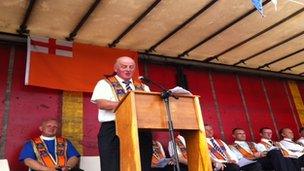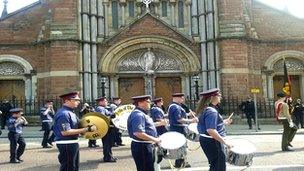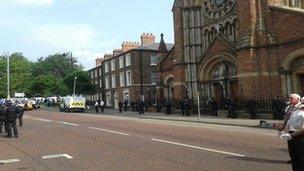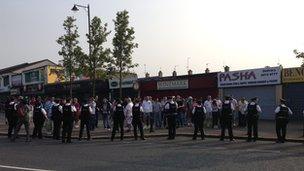Northern Ireland Orange Order leaders warn of cultural war
- Published
A band played The Sash as it stood outside St Patrick's Catholic Church
Orange Order leaders have condemned the Parades Commission and what they have called a "cultural war" by Irish republicans in Northern Ireland.
Earlier, thousands of Orangemen took part in 550 annual Twelfth of July parades across Northern Ireland.
A protest was held at the Belfast office of the Parades Commission, which rules on contentious parades.
It follows the commission's ruling that marchers cannot return along part of Crumlin Road in north Belfast.
Speaking at the Orange demonstration in Londonderry, the order's grand master, Edward Stevenson, said Protestants were facing an almost daily onslaught on their British heritage and culture.

Grand Master Edward Stevenson addressed fellow Orangemen in Londonderry
"Republicans are engaging in a cultural war to erode all symbols of Britishness," he told those gathered at the field in Wilton Park.
"The shameful decision to strip down the union flag from Belfast City Hall, following on from the outrageous naming of a children's play park in Newry after an IRA terrorist, are just some examples of the so-called 'shared future' envisaged by Sinn Féin."
Mr Stevenson also said it was time for the Parades Commission to be scrapped.
"I call on the secretary of state to immediately cease offering this unelected quango life support and finally put it out of its misery," he said.
Meanwhile, Orange Order Grand Chaplain Mervyn Gibson, speaking in Rasharkin, County Antrim, addressed the decision to stop flying the union flag throughout the year at Belfast City Hall and the ensuing loyalist protests against the decision.
"I believe the flag protesters did this generation a great service by waking us from our slumber - apathy, pessimism and defeatism were walking us into a united Ireland," he said.
"Rather than waking up to fight each other, we need to concentrate yet again on defeating republicanism, this time in the current cultural war.
"Let this generation not be found wanting, do not fight the war on yesterday's battlefield - fight the war on today's battleground as we unite to get rid of the Parades Commission."
Angry exchanges
Earlier, the outward leg of the north Belfast 'feeder' parade passed peacefully along the stretch of the Crumlin Road that separates loyalist and nationalist communities.
However, there were some angry exchanges and jostling outside St Patrick's Catholic Church, also in north Belfast.
A banner was attached to trees outside the Parades Commission's office in Bedford Street
One band played the Orange song The Sash while it was stopped outside the church.
This was in contravention of a ruling by the Parades Commission that said only hymns should be played. Other bands complied with the determination.
Later a space appeared to have been left outside the church by bands during a stoppage in the parade.
Sinn Féin Culture Minister Carál ní Chiulín, who was outside the church, said there had been breaches of the Parade Commission's ruling.
"Playing The Sash outside St Patrick's chapel is absolutely unacceptable," she said.
"This is not demonstrating to this community that there is any respect. Despite it all, this community is still asking for dialogue."
The annual Twelfth marches took place against a backdrop of tension over the parade in north Belfast.
The Parades Commission has ruled that marchers will not be allowed to return, later on Friday, along the part of the Crumlin Road, at Ardoyne shops, that separates nationalist and loyalist communities.
In the protest outside the commission's office on Friday, Orange county officers tied a banner to a tree outside the commission's door. The county grand master for Belfast, George Chittick, spoke to denounce the commission and said "No Surrender".
'No alternative'
The Orange grand master, Mr Stevenson, said the Parades Commission had left the order "no alternative" but to protest over the ruling.
He said that there was no co-ordinated plan for protests, but all must be peaceful.
In recent years there has been serious rioting in the nationalist Ardoyne area following the return leg of the parade.
The morning parade was blocked temporarily by police just before it reached the Ardoyne shops.
This was because there were many more supporters accompanying the bands than had been allowed by the Parades Commission ruling, that limited followers of the lodges and band to 100.

A band played music outside St Patrick's Church
After hundreds of supporters withdrew, police allowed the marchers to proceed and the parade passed the Ardoyne shops without incident, shortly after 09:00 BST.
Nationalist residents from the Greater Ardoyne Residents' Collective (GARC) held a small protest in the area, amid a heavy police presence.
GARC was one of two residents' groups from Ardoyne that had planned larger protests against the parade, which is described as a 'feeder' march for the Ligoniel lodges taking part in the main Belfast demonstration.
However, after the Parades Commission ruling on Wednesday evening, both GARC and Crumlin and Ardoyne Residents' Association (CARA) called off their larger demonstrations.
The marching season is a period of events from April to August, with the highpoint on 12 July when Orangemen march to commemorate William of Orange's victory over the Catholic King James II at the Battle of the Boyne in Ireland in 1690.

Later a space was left outside the church by bands
William III is revered by the order as a champion of his faith and the man who secured the Protestant ascendancy in Ireland. They commemorate his victory in their annual parades.
Many Catholics see the marches as triumphalist and sectarian with some traditional Orange routes passing through or past areas occupied mainly by Catholics and nationalists.
The day's biggest parade is at Newtownhamilton in County Armagh.
The Parades Commission ruling on the north Belfast parade was welcomed by nationalist politicians but angered unionists.
The Democratic Unionist Party requested that Northern Ireland Assembly be recalled to debate the ruling. That debate is arranged for Tuesday 16 July.

Nationalist protesters gathered at Ardoyne, amid a heavy police presence
On Thursday, Northern Ireland Secretary Theresa Villiers said she had no power to intervene over the Parades Commission's decision.
PSNI Chief Constable Matt Baggott said 43 of the parades taking place on 12 July - the height of the marching season - were "sensitive".
He has drafted in an extra 630 police officers from across Britain to support the police in Northern Ireland in the event of rioting.
- Published12 July 2013
- Published11 July 2013
- Published9 July 2013